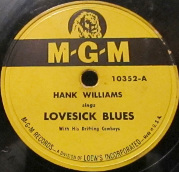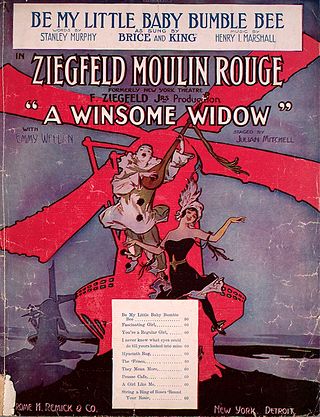
"Secret Love" is a song composed by Sammy Fain (music) and Paul Francis Webster (lyrics) for Calamity Jane, a 1953 musical film in which it was introduced by Doris Day in the title role. Ranked as a number 1 hit for Day on both the Billboard and Cash Box, the song also afforded Day a number 1 hit in the UK. "Secret Love" has subsequently been recorded by a wide range of artists, becoming a C&W hit firstly for Slim Whitman and later for Freddy Fender, with the song also becoming an R&B hit for Billy Stewart, whose version also reached the top 40 as did Freddy Fender's. In the UK, "Secret Love" would become the career record of Kathy Kirby via her 1963 remake of the song. The melody bears a slight resemblance to the opening theme of Schubert's A-major piano sonata, D.664.
"There's No Business Like Show Business" is an Irving Berlin song, written for the 1946 musical Annie Get Your Gun and orchestrated by Ted Royal. The song, a slightly tongue-in-cheek salute to the glamour and excitement of a life in show business, is sung in the musical by members of Buffalo Bill's Wild West Show in an attempt to persuade Annie Oakley to join the production. It is reprised three times in the musical.
"Temptation" is a popular song published in 1933, with music written by Nacio Herb Brown and lyrics by Arthur Freed.
"Long Ago (and Far Away)" is a popular song with music by Jerome Kern, and lyrics about nostalgia by Ira Gershwin from the 1944 Technicolor film musical Cover Girl starring Rita Hayworth and Gene Kelly and released by Columbia Pictures. The song was nominated for the Academy Award for Best Original Song in 1944 but lost out to “Swinging on a Star”, from Going My Way. The song was published in 1944 and sold over 600,000 copies in sheet music in a year. In 2004 it finished #92 in AFI's 100 Years...100 Songs survey of top tunes in American cinema.
"All Alone" is a popular waltz ballad composed by Irving Berlin in 1924. It was interpolated into the Broadway show The Music Box Revue of 1924 where it was sung by Grace Moore and Oscar Shaw. Moore sat at one end of the stage under a tightly focused spotlight, singing it into a telephone, while Oscar Shaw sat at the other, doing the same.
"Shrimp Boats" was a popular song in the 1950s.
"Love Letters" is a 1945 popular song with lyrics by Edward Heyman and music by Victor Young. The song appeared, without lyrics, in the movie of the same name performed by Dick Haymes, and was nominated for the Academy Award for Best Original Song in 1945 but lost out to "It Might as Well Be Spring". The song has been covered by a number of artists, most notably by Nat King Cole (1957), Ketty Lester (1962), Elvis Presley (1966), and Alison Moyet (1987).

"Lovesick Blues" is a Tin Pan Alley song, composed by Cliff Friend, with lyrics by Irving Mills. It first appeared in the 1922 musical "Oh, Ernest", and was recorded that year by Elsie Clark and Jack Shea. Emmett Miller recorded it in 1925 and 1928, followed by country music singer Rex Griffin in 1939. The recordings by Griffin and Miller inspired Hank Williams to perform the song during his first appearances on the Louisiana Hayride radio show in 1948. Receiving an enthusiastic reception from the audience, Williams decided to record his own version despite initial push back from his producer Fred Rose and his band.
"You've Changed" is a popular song published in 1942 with music by Carl Fischer and words by Bill Carey. The melody features descending chromaticism. The song was first recorded on October 24, 1941 by Harry James & His Orchestra.

"Be My Little Baby Bumble Bee" is a popular song. The music was written by Henry I. Marshall and the lyrics by Stanley Murphy. The song was published in 1912, and appeared in the 1912 play A Winsome Widow.
"I'll Be Seeing You" is a popular song about missing a loved one, with music by Sammy Fain and lyrics by Irving Kahal. Published in 1938, it was inserted into the Broadway musical Right This Way, which closed after fifteen performances. The title of the 1944 film I'll Be Seeing You was taken from this song at the suggestion of the film's producer, Dore Schary. The song is included in the film's soundtrack.
"Moonlight Becomes You" is a popular song composed by Jimmy Van Heusen with lyrics by Johnny Burke. The song was written for the Paramount Pictures release Road to Morocco (1942) and published in 1942 in connection with the film. Vic Schoen wrote the arrangement.
"Together" is a 1928 popular song with music by Ray Henderson and lyrics by Buddy G. DeSylva and Lew Brown. The most popular 1928 recording of the song, by Paul Whiteman, with Bix Beiderbecke on cornet, was a #1 hit for two weeks.
"Five Minutes More" is a 1946 American pop song written by Sammy Cahn (lyrics) and Jule Styne (music). It is sometimes referred to as "Give Me Five Minutes More". It was featured in the movie Sweetheart of Sigma Chi, sung by Phil Brito, and was a number one hit record in 1946 for Frank Sinatra.

Andy Williams Sings Rodgers and Hammerstein is the second studio album by American pop singer Andy Williams and was orchestrated and conducted by Alvy West. It was released in February 1958 by Cadence Records and focuses upon songs composed by Richard Rodgers with lyrics by Oscar Hammerstein II.
"Oh! What it Seemed to Be" is a song composed by Bennie Benjamin, George Weiss and Frankie Carle. The song was most popular in 1946, and was taken to number 1 that year by both Frank Sinatra and the Frankie Carle orchestra, the latter with Marjorie Hughes on vocals.
"For Ol' Times Sake'" is a song by Tony Joe White, covered in 1973 by Elvis Presley.
"Aren’t You Glad You’re You?" is a 1945 popular standard composed by Jimmy Van Heusen, with lyrics by Johnny Burke. Van Heusen and Burke wrote the song for the film The Bells of St. Mary's, directed by Leo McCarey, and starring Bing Crosby and Ingrid Bergman in the main roles. Bing Crosby presents the song in the film.
"There You Go" is a song written and originally recorded by Johnny Cash.
"The Sons of Katie Elder" is the theme song for the 1965 Paramount western of the same name starring John Wayne. It was written by Ernie Sheldon (words) and Elmer Bernstein (music).




